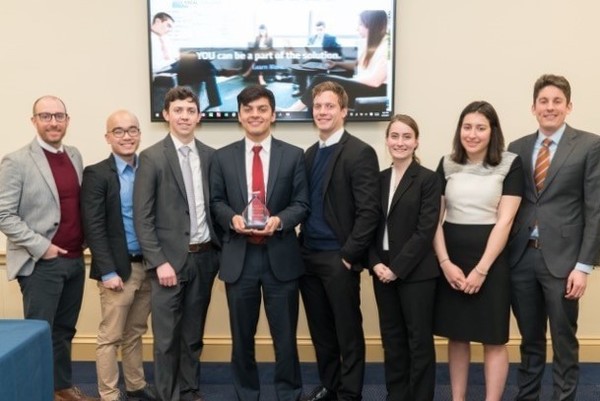

Notre Dame’s Fiscal Challenge championship team included Michael Dang (second from left), Cole Folwell, Adam Kulam, Jason Zinn, Emily Merola, and Grace Companile. It was advised by finance professor Jason Reed (far left) and economics professor Forrest Spence (far right).
A new Notre Dame student club focused on macro-scale economics and fiscal policy won the first national contest it entered, knocking off Harvard University, the defending champion.
The Federal Reserve and Fiscal Challenge Club was formed last year to give MBA and undergraduate students real-world opportunities to employ the skills they were learning in class. This spring, the club entered the Fiscal Challenge, run by an educational nonprofit of the same name that aims to expand students’ understanding of fiscal policy through experiential education.
Notre Dame’s six-person team — which features five Arts and Letters students — developed a plan to stabilize the United States’ debt-to-GDP ratio at current levels through 2046. Notre Dame’s team was chosen as one of three finalists, along with Harvard and Northeastern University, to present its plan live and take questions from a panel of judges.
They went to Washington, D.C., in April for the finals, visiting Capitol Hill and meeting top thinkers in economic policy. And they won.
“We were not expecting it, since it was our first year, but we were happy our hard work paid off in that way,” said Emily Merola, a first-year student in the Department of Economics and secretary of the club.
Other team members include Grace Campanile, a first-year majoring in business and economics; Adam Kulam, a sophomore English and economics major; Jason Zinn, a sophomore economics and political science major; Cole Folwell, a sophomore political science major; and Michael Dang, a junior management major.
The club’s plan to address U.S. debt included six proposals: Social Security reform, a carbon tax, removing certain tax exclusions, leasing of federally owned land, legalizing marijuana, and privatizing public infrastructure.
Currently, the U.S. debt is about 77 percent of GDP, but that number is expected to nearly double in the next two decades. Jason Reed, an assistant teaching professor in the Department of Finance and an adviser for the club, said judges appreciated the club’s ability not only to meet the goal of stabilizing the debt-to-GDP ratio, but to actually lower it to 59 percent.
“They wanted to overshoot the goal of just stabilizing at 77 percent, because that 77 percent includes all the spending the U.S. had to do to get out of the Great Recession,” Reed said. “The proposals the club created were not just outside of the box, but changed what the box looked like. The judges were thoroughly impressed.”
Reed said he and Forrest Spence, an assistant teaching professor in the Department of Economics, wanted students to understand the complexity of developing policies that are beneficial and politically attainable, as well as how to measure impacts of those proposals on different groups of people and government agencies.
Merola said she and fellow club members enjoyed the opportunity to put classroom lessons to use.
“The best type of learning is when you can get involved in actual applications of it,” she said. “That’s one of the reasons I came to Notre Dame, and I’m glad I could find a club to give me that opportunity.”
Originally published by at al.nd.edu on May 11, 2017.